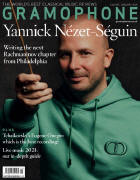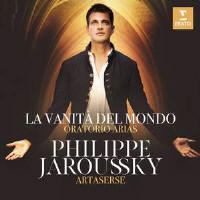Texte paru dans: / Appeared in:
Erato 9029517929 |
|
|
Outil de traduction (Très approximatif) |
|
|
Reviewer:
Richard Wigmore
Never one to rest on his laurels, Philippe Jaroussky has come up with a typically enterprising selection of Italian Baroque oratorio arias, almost all written for castrato, several recorded for the first time. The Italianised Saxon Handel provides the one famous number, the sarabande aria ‘Lascia la spina’, later recycled as ‘Lascia ch’io pianga’ in Rinaldo. But only outand-out specialists are likely to have encountered, say, the Parmese Fortunato Chelleri or the Neapolitan Nicola Fago. I don’t agree with Jaroussky, in his brief personal note, that the style of these sacred arias is distinct from contemporary opera. These assorted biblical and allegorical figures, even – in the splenetic Chelleri aria – God himself, grieve, rage and meditate in essentially the same idiom as their counterparts in opera seria. The crucial thing is that their music is consistently compelling. Among the plums are a haunting lullaby from Alessandro Scarlatti’s La Giuditta (on the ever-popular story of Judith and Holofernes), an impassioned scene from Fago’s Il faraone sommerso (on the Israelite exodus from Egypt) and a searing lament from Caldara’s Morte e sepoltura di Christo. With his sensuous, sweetly rounded timbre – more counter-soprano than counter-tenor – Jaroussky is a perfect fit for the sorrowful and reflective arias that predominate. He phrases imaginatively, often with a sense of improvisatory freedom, and dramatises rather than merely relates. Words are invariably savoured. Jaroussky brings a seductive tenderness to Pleasure’s carpe diem admonishment in ‘Lascia la spina’, expressively varying the final refrain, and suggests defiance amid the pathos of the Caldara lament. And through subtle inflections he hints at the insincerity of the Scarlatti lullaby – for all its apparent serenity, this is Judith’s Nurse singing Holofernes to sleep before his murder. In fast arias Jaroussky always deploys his coloratura brilliance in the service of the drama. He is delightfully blithe in Pleasure’s lilting aria from Pietro Torri’s La vanità del mondo, an oasis of levity that gives the disc its name, and fulminates imposingly in the Chelleri aria, unfurling a baritonal chest register en route. Throughout, the players of Artaserse match him in sensitivity and dramatic flair. Only in the high tessitura of an aria from Benedetto Marcello’s Giuditta is Jaroussky uncomfortably stretched, though arguably the sense of effort, including some squally sounds in alt, enhances this fanatical expression of divine vengeance. I wish the otherwise informative note had given a proper context for each aria. But no Jaroussky fan is going to want to miss this recital, adventurously planned and executed with the singer’s trademark mix of refinement and bravado.
|
|




